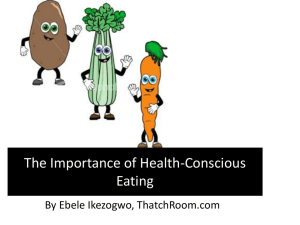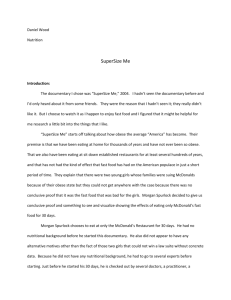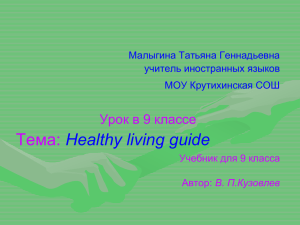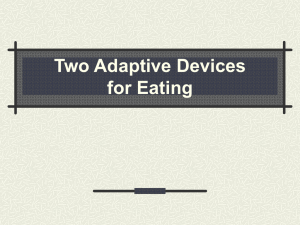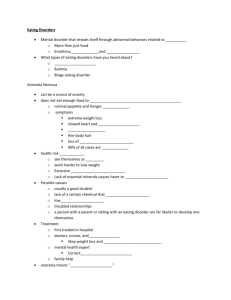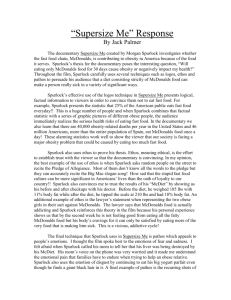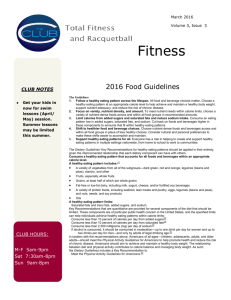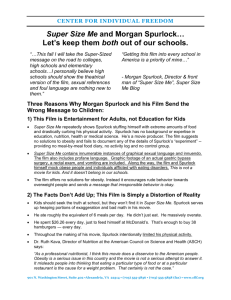Food - Bolt
advertisement
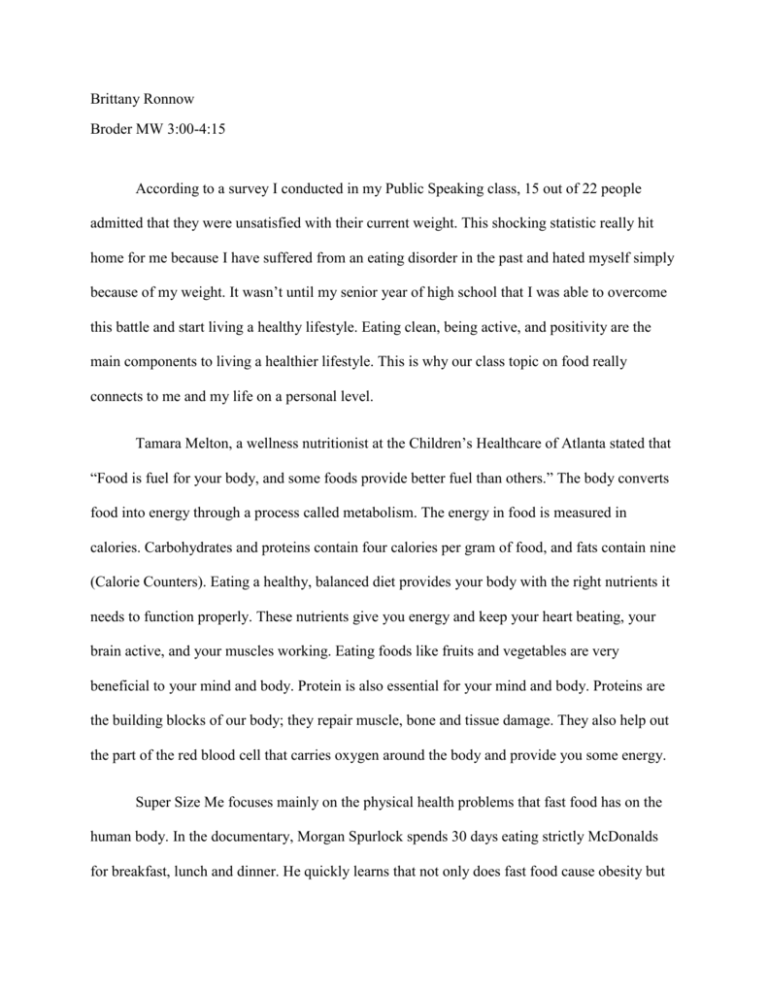
Brittany Ronnow Broder MW 3:00-4:15 According to a survey I conducted in my Public Speaking class, 15 out of 22 people admitted that they were unsatisfied with their current weight. This shocking statistic really hit home for me because I have suffered from an eating disorder in the past and hated myself simply because of my weight. It wasn’t until my senior year of high school that I was able to overcome this battle and start living a healthy lifestyle. Eating clean, being active, and positivity are the main components to living a healthier lifestyle. This is why our class topic on food really connects to me and my life on a personal level. Tamara Melton, a wellness nutritionist at the Children’s Healthcare of Atlanta stated that “Food is fuel for your body, and some foods provide better fuel than others.” The body converts food into energy through a process called metabolism. The energy in food is measured in calories. Carbohydrates and proteins contain four calories per gram of food, and fats contain nine (Calorie Counters). Eating a healthy, balanced diet provides your body with the right nutrients it needs to function properly. These nutrients give you energy and keep your heart beating, your brain active, and your muscles working. Eating foods like fruits and vegetables are very beneficial to your mind and body. Protein is also essential for your mind and body. Proteins are the building blocks of our body; they repair muscle, bone and tissue damage. They also help out the part of the red blood cell that carries oxygen around the body and provide you some energy. Super Size Me focuses mainly on the physical health problems that fast food has on the human body. In the documentary, Morgan Spurlock spends 30 days eating strictly McDonalds for breakfast, lunch and dinner. He quickly learns that not only does fast food cause obesity but fast food also leads to a number of other health problems. Spurlock’s liver was already suffering from damage after his 30 day documentary and according to his doctor if he continued on with his experiment it may be possible for him to die from liver failure. By eating only McDonalds Spurlock was missing out on over 50% of the daily amount of the vitamins his body needed to function properly; causing him to have high blood pressure, depression, and decreased sexual ability. Junk food is full of empty calories, fats, sugar, lacking nutrients, fiber and protein which causes your blood sugar levels to drop suddenly after eating, leaving you feeling fatigued, moody and craving more sugar(Zoumbaris). This could be the reason why people who to habitually eat unhealthy continue to put themselves down; simply because they are not getting the right amount of energy their brain and body needs to function causing them to feel depressed. Spurlock admitted himself that during his experiment he was feeling weak, fatigue, short of breathe and unhappy. Along with eating clean, exercise and becoming more active can improve your long term health. As you keep exercising, you feel even better about yourself and everything around you. You feel what they call “the runner’s high,” meaning your endorphins, or neurotransmitters in your brain, are released during exercise. Endorphins push someone to keep going on with their exercise even though they are exceeding their limit. They release epinephrine, serotonin and dopamine; all are chemicals in your brain that contributes to adrenaline, motivation, and wellbeing (Calorie Counters). By making exercise part of your daily routine you will not only start to look better but you will mentally start to feel better and have a better sense of well-being. Being a college student I understand how easy it can be to slip into an inactive, unhealthy lifestyle. I also know firsthand how hard it is to get rid of that laziness and find motivation. Hopefully after taking this class where food is a primary focus more and more students can understand the importance of eating healthy and the damage that junk food has on our body. Remember, good health can only benefit you but bad health could cost you your life. Works Cited "Carbs – Simple vs Complex, High Glycemic vs Low Glycemic, Good vs Bad." Calorie Counters. N.p., n.d. Web. 18 Apr. 2013. Ronnow, Brittany. “Health Survey” Survey. 2 April 2013. Zoumbaris, Sharon K. Nutrition. Santa Barbara, CA: Greenwood/ABC-CLIO, 2009. Print.

